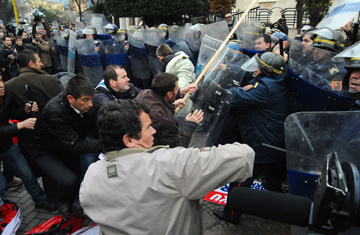
Albanian riot police clash with demonstrators protesting over alleged government corruption
A week after an antigovernment uprising left three people dead and at least 150 injured, Albanians are expected to return to the streets of the capital Tirana on Friday to march in their honor. Gjergji Filipi, a 34-year-old economist, says he will be there to leave flowers for the men who were shot and killed by army soldiers. Filipi was outside Prime Minister Sali Berisha's office on Jan. 21, the day the men died, joining at least 20,000 other Albanians as they voiced their frustration with the country's broken politics.
"I was there to say, to all politicians, 'I do not want you to lie to me anymore,'" says Filipi, a university professor who is also the research director of Agenda Institute, a private nonprofit that studies public policy. "Many Albanians are just very tired of being lied to continuously, day after day. We want to build our lives on institutions that we trust."
Albania has long suffered from corruption and a lack of transparency, but over the past week, those issues have threatened to topple the rule of 66-year-old Berisha, leader of the Democratic Party of Albania. On Wednesday, the European Union sent an envoy to Tirana to urge leaders to defuse the crisis. That same day, Berisha canceled a counterdemonstration in support of his party that was planned for Saturday. The main opposition leader, Tirana Mayor Edi Rama, 46, said his Socialist Party of Albania would carry on with Friday's march, insisting it would be peaceful. But Berisha, who blames Rama's supporters for last week's clashes, warned that more violence would come.
On one level, the crisis in Albania is a power clash between Berisha and Rama, who have been at each other's throats since June 2009, when Berisha's party barely won a majority in a disputed election clouded by allegations of fraud. The Socialists have refused to recognize the results. Then, on Jan. 14, Deputy Prime Minister Ilir Meta resigned after a video surfaced — allegedly recorded by a member of his own party — that showed him asking a colleague to bribe someone in order to influence a power-plant tender.
Berisha has insisted the video is fake, but the scandal was enough to spark last week's protests, the most violent the country has seen in almost 15 years. The public's rage may be targeted at Berisha and his party for now, but many Albanians believe that all of their politicians and institutions are corrupt, says Thimi Samarxhiu, a journalist with the Albanian daily newspaper Mapo. "Everybody who comes into power here makes the same mistakes," Samarxhiu says. "They have money at their disposal, and soon they are making corruption, not progress."
Albania has stabilized since emerging from North Korea–style isolation after the death in 1985 of Enver Hoxha, the communist autocrat who ruled the small, poor Balkan country for more than 40 years. But the nation, home to 3 million people, has struggled to orient itself. Allegations of corruption have tainted every election since 1992, according to the election-monitoring body Organization for Security and Cooperation in Europe. And in 1997, the country was paralyzed by riots after the collapse of pyramid investment schemes left thousands of Albanians penniless.
Albania's institutions are weak, and its laws are virtually ignored, says Andi Kananaj, a lawyer and activist: "Even the judges here have given up. Many end up taking bribes because there is no routine of just following what the law says and making decisions based on that. The assumption is that everyone — doctors, judges, politicians, whoever — takes bribes."
According to Alexandros Mallias, Greece's former ambassador to Albania, for much of the past decade Albania was seen as a rising economic star in the Balkans. The country's economy grew at an average rate of 7.5% from 2000 to 2008, according to government and independent data. Mallias recalls that European scholars and diplomats who had gathered in Tirana for a conference last October brimmed with optimism for the country. "But the Albanians were entirely pessimistic," Mallias says. "They kept saying, 'No, you don't know the real story.' And they turned out to be right."
The real story was sobering, says economist Filipi. The Albanian government never acknowledged the impact of the global financial crisis on the country, declaring its economy immune even as the growth rate slowed to 2.8% in 2009. Filipi also questions the official unemployment figure of 14%, which he says is suspiciously low. "If you knock on the doors of apartments in Tirana, every third door will [be answered by] someone out of work," he says. "It's difficult to keep lying to 1 million unemployed people and thinking they will still believe you."
It's even more difficult when you are trying to get the international community on your side. Albania became a NATO member in 2009 but its quest for E.U. membership has stalled. "In Albania, Europe sees stalemate and corruption, and now it sees violence," says Gledis Gjipali, executive director of the European Movement in Albania. "It's only going to take the country further away from integration. That's the last thing it needs."
Especially since the E.U., with its regulations and enforcers, could help save Albania. For now, Albanians can only hope their leaders will end their power plays and save the country themselves, before any more blood is spilled.
